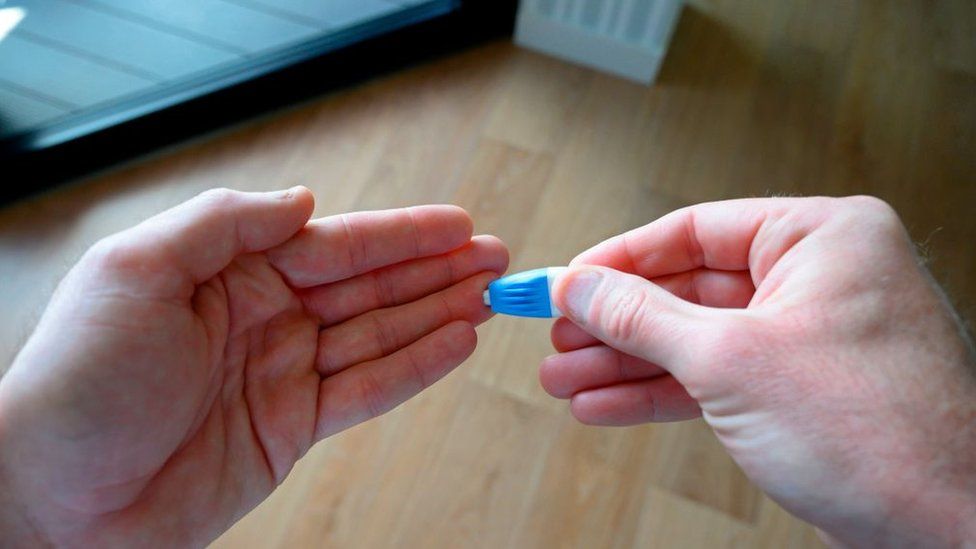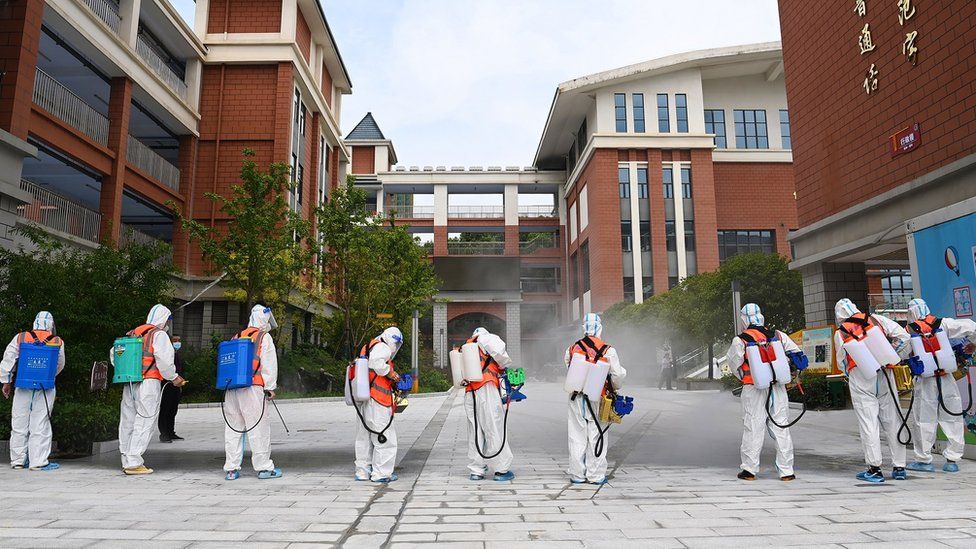One vaccine for many variantsTwo separate research teams have reported results of antibodies from SARS survivors which could help towards developing a vaccine that protects against a broad range of Covid variantsOne study, published on Wednesday in The New England Journal of Medicine, identified "high-level, broad-spectrum" antibodies in blood samples from survivors of the original SARS outbreak in 2003 who recently received the Pfizer vaccine for Covid.
In test tube experiments, the antibodies of the survivors could neutralise all of the current Covid variants of concern and five viruses that have been identified in bats and pangolins.
The findings from these studies could be a step toward developing new antibodies that would be effective against multiple different coronaviruses, the teams say.
More than 1,000 people who attended Latitude Festival last month have tested positive for coronavirus, according to reports.
The festival, which ran from July 22 to 25, was part of the Government’s Events Research Programme attended by about 40,000 people.
Revellers had to show proof of a negative Covid-19 test or be double vaccinated to access the site at Henham Park in Suffolk.
However, data released by Suffolk County Council reportedly shows 1,051 people tested positive for the virus in the days after the event.
The research suggests that 619 people got infected at Latitude, while 432 would have been infectious at the time of the event.
Stuart Keeble, director of Suffolk Public Health, said: “Latitude Festival was part of an event research pilot by central government, which set the parameters and Covid guidance for the event.
“We were one of many partners who helped implement Covid security in line with Government advice.”
Covid inquiries should start before end of the year, campaigners say
The UK Government must “show some leadership” and ensure that statutory coronavirus inquiries start before the year is out, campaigners have said.
The Covid-19 Bereaved Families For Justice group is calling on Wales and Northern Ireland to follow Scotland’s example, after First Minister Nicola Sturgeon said an independent inquiry would begin by the end of 2021.
A UK-wide inquiry will start next spring, Boris Johnson has said. But campaigners said it should commence before the end of this year.
Lobby Akinnola, whose 60-year-old father Olufemi died with coronavirus in April 2020, said: “Today’s announcement will rightly leave bereaved families across the rest of the United Kingdom wondering why this has been announced for Scotland but not in the other devolved regions.
“It’s not just the Prime Minister kicking the UK-wide inquiry continually into the long grass, but the Welsh Assembly and Northern Irish Executive who are yet to even commit to holding a statutory inquiry into their own handling of the pandemic.
“This simply isn’t good enough and it’s time for the UK government, the Welsh Assembly and the Northern Irish Executive to show some leadership and rise to the occasion and ensure statutory inquiries commence before the end of the year within the devolved administrations and for the UK.”
New nurses and midwives feel “unprepared and unsupported in first roles”, a union has said.
Unison said that more must be done to support newly qualified workers and students as they start their career.
It comes after a poll found that 70 per cent believe they have missed out on important learning experiences during the coronavirus crisis.
Many newly qualified midwives and nurses and students worked on the front line of the pandemic.
However, more than half of final year students said they are worried they are not as prepared for qualification as they should be, according to a survey of 182 student and newly qualified nurses and midwives.
Unison’s national officer for nursing, Stuart Tuckwood, said: “Unprecedented demands have been placed on student nurses and midwives during Covid.
“Constructive and meaningful support in the workplace is vital for those newly qualified so they can fulfil their potential.
“Some may lack confidence because they’ve missed out on some training opportunities.”
12 hours ago
Ryanair blamed the UK Government for not reducing air passenger duty and a lack of Covid recovery incentives as it confirmed it is pulling out of Northern Ireland.
Routes from Belfast International Airport to a number of European destinations will stop on October 30.
The budget airline stopped flying from the City of Derry Airport earlier this year and will also end a number of seasonal flights from Belfast City Airport.
In a statement, Ryanair confirmed it will cease operations from the Belfast International and Belfast City airports in the autumn.
A spokesman for the airline said: “Due to the UK Government’s refusal to suspend or reduce APD (air passenger duty), and the lack of Covid recovery incentives from both Belfast airports, this winter Ryanair will cease operations from Belfast International and Belfast City Airport from the end of the summer schedule in October and these aircraft will be reallocated to lower-cost airports elsewhere in the UK and Europe for the winter schedule, which starts in November.”
A spokesman for Belfast International Airport expressed disappointment,
“It has been a difficult period for aviation and a time when consumers need some stability and faith in the Northern Ireland air transport network,” they said.
The UK has recorded 174 Covid-related deaths and 31,914 new infections, according to daily Government figures.
Some 131,283 people received their second dose of the vaccine on Monday, meaning just over 77 per cent of the population are now fully vaccinated.
This time last week, on August 17, some 26,852 people had tested positive for Covid and 170 people had the virus listed on their death certificate.
Opposition parties have called on the Welsh Government to follow Scotland’s lead and hold an independent inquiry into the handling of the pandemic.
First Minister Nicola Sturgeon said the judge-led inquiry in Scotland will be established by the end of the year.
The Conservatives and Plaid Cymru accused the Labour-run Welsh Government of seeking to avoid scrutiny by not holding a separate inquiry in Wales.
Welsh Conservative Senedd leader Andrew RT Davies said: “The Scottish First Minister - like the Prime Minister - has done the right thing by announcing a public inquiry into the handling of the pandemic by her government.
“Regrettably, in Wales, Labour and the First Minister Mark Drakeford have sought to block such scrutiny, transparency and accountability and it’s an unacceptable situation which cannot continue.
“Decisions made in Wales - both good and bad - had a direct impact on lives and that cannot be dismissed by a Labour administration that was keen to stress at every opportunity that they have done things differently.”
In order for the US to reach herd immunity against COVID-19, those who are unvaccinated will need to get inoculated, said Dr Anthony Fauci, the nation’s top infectious disease expert.
“We can get herd immunity really easily if we get everybody vaccinated,” Fauci said during an interview on MSNBC Tuesday.
When asked by MSNBC’s Mehdi Hasan whether the nation can reach herd immunity without the help of those who are resistant to getting the vaccine, Fauci replied, “I don’t think so.”
“The only way you can get through herd immunity without them is if the unfortunate situation, if they all wind up getting infected,” said Fauci, the director of the National Institute of Allergy and Infectious Diseases.
Half a million Covid vaccines arrived in the Israeli-occupied West Bank and Gaza on Tuesday.
The US donated the vaccines as Palestinian officials work to boost uptake and counter a surge in new cases by requiring some workers to get the jab.
Palestinians began administering vaccines in February, but despite having purchased or received what officials have called “an abundance of doses”, uptake has stalled at just 35% of those eligible in the West Bank and around 11% in Gaza.
Prime Minister Mohammad Shtayyeh, whose Palestinian Authority has limited self-rule in the West Bank, said that unvaccinated public-sector employees would be put on unpaid leave, with immediate effect.
Switzerland is being hit by a fourth wave of the coronavirus with a very worrying rise in infections, according to the head of the government’s crisis team.
The number of new infections has hovered between 2,500 and 3,000 per day recently, close to the level of the third wave earlier this year, Patrick Mathys said
“The current situation should be seen as unfavourable and to some extent very worrying. We have to describe the current situation as the fourth wave,” he added.
New cases rose by 2,993 on Tuesday, taking the total number to 761,978 since the pandemic began. The government also reported six more deaths, taking the death toll to 10,461.
Mr Mathys said he was concerned about hospitals and the low level of vaccinations.
Ireland’s economy will be fully open by Christmas, the country’s health minister has said.
Stephen Donnelly said the current plan is to continue with the next phase of reopening and the easing of Covid-19 restrictions.
Earlier, HSE chief executive Paul Reid said that 86% of Irish adults are fully vaccinated, while 88,000 jabs have been given to 12 to 15-year-olds.
The National Public Health Emergency Team is meeting on Wednesday to consider the next steps in the response to the pandemic, with the Cabinet’s Covid-19 sub-committee set to meet on Friday.
https://www.standard.co.uk/news/uk/covi ... 52017.html






















